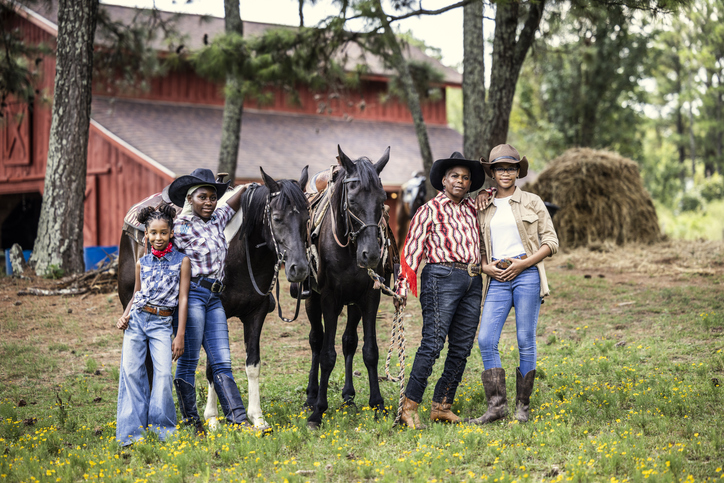Rodeo Black Cowgirls Who Made History
5 Black Cowgirls Who Rode Hard, Broke Barriers, And Made History - Page 3
Share the post
Share this link via
Or copy link

Source: MoMo Productions / Getty
Saddle up, it’s officially rodeo season in Houston!
Journalist Taylor Crumpton coined the term “been country” in reference to the critics questioning the authenticity of Beyoncè’s first full-length country music album, Cowboy Carter, quickly reminding people that music has no color, Instead, she challenged the naysayers, using the superstar’s upbringing as a receipt that would dismantle all of the chatter around the former Destiny Child band member’s decision to embrace her roots.
“The truth is that country music has never been white. Country music is Black. Country music is Mexican. Country music is Indigenous,” Crumpton wrote. “She did not need to read Black Country Music: Listening For Revolutions by Francesca Royster, Hidden in the Mix: The African American Presence in Country Music, or My Country, Too: The Other Black Music by Pamela E. Foster to understand that. Knowles-Carter simply needed to walk outside her house in Houston, Texas and witness the cultural exchange between Black, Tejano, and Indigenous communities in her hometown. She did not need white validation to classify her country—she has been country for the entirety of her life.”
RELATED CONTENT: Despite Being The Best Selling New Country Album Of 2024, Beyoncé’s ‘Cowboy Carter’ Gets Zero CMA Nominations
With Cowboy Carter, Beyoncè has not only reclaimed the genre, but propelled the careers of country music artists like Tiera Kennedy, Tanner, Adell, Reyna Roberts, and Brittney Stephens, putting them in the spotlight to shine in a world that continues to diminish the impact that Black women have on this country, period.
Love MadameNoire? Get more! Join the MadameNoire Newsletter
We care about your data. See our privacy policy.
Between 2001 and 2007, Beyoncè has performed at the annual Houston Livestock Show and Rodeo, a total of four times, first alongside her Destiny’s Child bandmates, and then solo for the following three years.
First held in 1932, The Houston Livestock Show and Rodeo, also known as RODEOHOUSTON, is an annual family-friendly event held in the Texas city intended to promote agriculture, education, entertainment, and Western heritage. For nearly 100 years (93 to be exact), the event has become a staple, but beyond the fashion, food, concerts, and overall fun, it is important to note some of the deep underlying history behind the history of Black people and western culture.
Meet the Black women who left an indelible mark on the rodeo and western culture as we know it today.
1. Verna Lee “Boots” Booker Hightower
As the first Black woman to compete in the Houston Livestock Show and Rodeo in 1969, Verna Lee “Boots” Hightower was a trailblazing Black cowgirl and civil rights activist best known for excelling in barrel racing. In addition to breaking barriers within the rodeo, Hightower and her husband, fellow horse trainer and rodeo competitor, Ted Hightower, won a landmark lawsuit that led to the desegregation of schools in Houston, Texas.
2. Mary Fields
Known as “Stagecoach Mary,” Mary Fields was born into slavery in Tennessee prior to becoing a legendary figure in the American West. Fields played a significant role in the development of the West, and upon gaining her freedom, she moved to Montana where she became the first Black woman to be employed as a mail carrier for the U.S. Postal Service.
3. Johanna July
A Black Seminole vaquera, Johanna July left a mark in the rodeo world thanks to her exceptional skills in taming horses and raising cattle in Texas. Thanks to her expertise and resilience, July is a prominent figure among early Black cowgirls throughout the 1900s.
4. Henrietta Williams Foster
A cowhand who resided in Refugio County, located in the southern part of the Lonestar state, Henrietta Williams Foster was affectionately called Aunt Rittie and is described as a “tough-as-nails woman who would ride her horse sidesaddle in long skirts and could perform the same work as the men.”
5. Sylvia Rideoutt Bishop
In 1954, Sylvia Rideoutt Bishop became the first Black woman licensed to train Thoroughbred racehorses in the United States. With a career spanning across six decades, she is said to have trained roughly 200 horse, making a significant impact on the race horsing industry.
RELATED CONTENT: 7 Looks From The Houston Rodeo That Have Us Looking For Lassoes!
-

Meet Dominique Fils-Aimé, The Haitian-Canadian Star Redefining Jazz For A New Generation: ‘This is My Vision' [Exclusive]
-

Cooking With Purpose — How Brittney Williams Honors Her Caribbean Roots Through Food
-

Bucket Baddies With Big Energy — The 30 Hottest NBA Players In The Game Right Now
-

9 Famous Lesbian Women Who Were Married To Men



